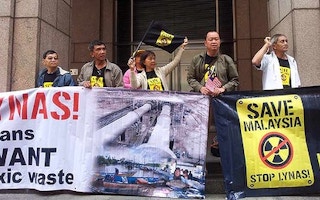Australian-owned company Lynas is quietly shipping rare earth to a processing plant in Malaysia - without a firm plan in place to dispose of dangerous radioactive waste. Wendy Bacon reports
If a manufacturing plant involving radioactive materials moved into your community, one of the first things you would ask is, “what’s going to happen to the waste?”
This is exactly how residents of Kuantan on Malaysia’s east coast reacted when the Australian company Lynas announced plans to build LAMP, the world’s biggest rare earth processing plant in their area.
Several years later, they have no clear answer. Indeed last week, while the plant that will use concentrate imported from Lynas’s rare earth mine at Mount Weld in Western Australia was finally ramping up for production, the Malaysian Government and the company were in direct conflict about what would happen to the waste.
On 8 November, after two years of delays caused by court challenges and inquiries, a halt on a temporary licence granted to protesting citizens in September was lifted. Five days later, Lynas secretly moved 100 containers of rare earth concentrate from a depot at Bilbra Lake and quietly shipped them through Fremantle Port. The containers were unloaded and delivered under police escort to the $800 million plant on 22 November.
But last week, four Malaysian government ministers backed by the entire cabinet declared that Lynas’s temporary licence will be cancelled if it does not fulfill a condition to export all radioactive waste from Malaysia. Lynas was forced to call a share trading halt claiming that there is no such condition in its licence, which at this stage is not public. By the end of last week, Lynas’s share price fell further to 55 cents, down from $1.21 this time last year.
The 17 rare earth elements are used in many products including mobile phones, flatscreens, missiles and wind turbines. All environmental experts agree that mining, refining and recycling rare earths can have serious, long term consequences if not carefully managed, specifically because the elements are found with thorium, which is mildly radioactive. Ninety-six per cent of global production currently occurs in China, where mines and plants have caused serious environmental degradation.
Read the full story here.

















